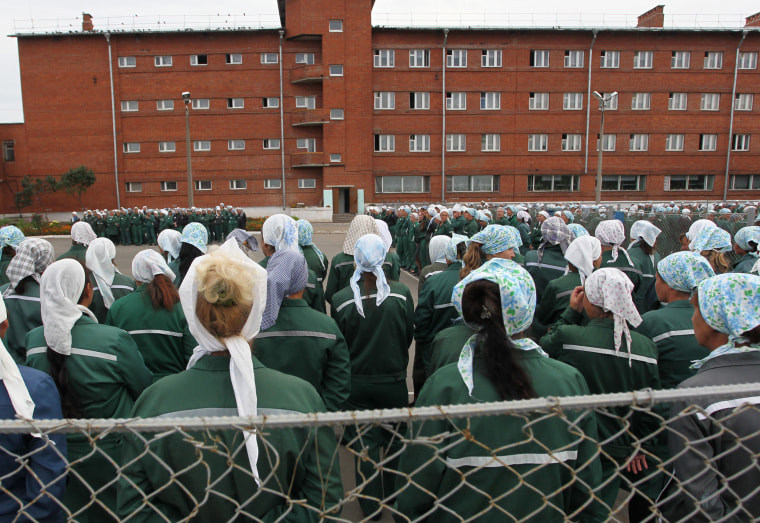Brittney Griner likely entered a system of isolation, grueling labor and psychological torment when she was transferred to a penal colony, the successor to the infamous Russian gulag, former prisoners and advocates said prior to her release in a prisoner swap Thursday.
Griner was transferred to a penal colony more than 200 miles east of Moscow last month, to begin a nine-year sentence handed down by a Moscow court in October.
She was free Thursday after a trade for arms dealer Viktor Bout.
Human rights violations are a regular feature of many of the camps, according to the U.S. State Department, human rights groups and others who have maintained regular contact with prisoners in Russia. That the WNBA star is a gay Black woman could have added unknown variables to a penal system that is known to be remote and harrowing.
“Conditions in prisons and detention centers varied but were often harsh and life threatening,” a 2021 State Department report on Russian human rights abuses said. “Overcrowding, abuse by guards and inmates, limited access to health care, food shortages, and inadequate sanitation were common in prisons, penal colonies, and other detention facilities.”
The report notes that “physical and sexual abuse by prison guards was systemic,” that torture of prisoners was pervasive — at times resulting in death or suicide — and that discriminatory protections against women and people of color were not often enforced. The law also does not prohibit discrimination based on sexual orientation.
“Russian prisons are grim, even relative to prisons in other countries. And the Putin regime has ramped up hostility towards gays and lesbians as part of its broader policy of hard-line nationalism,” said Muriel Atkin, a Russian history professor at George Washington University.
That would have added further concerns to a fraught situation. While tensions between the White House and the Kremlin continue to boil over the Russian invasion of Ukraine, Griner’s agent, Lindsay Colas, emphasized that she believed Moscow was using Griner’s imprisonment as leverage against the U.S.
“Brittney Griner’s nine-plus year sentence is regarded as harsh and extreme by Russian legal standards,” Colas said in a statement after her appeal was denied in October. “Today’s disappointing, yet unsurprising, appeal outcome further validates the fact that she is being held hostage and is being used as a political pawn. Brittney Griner is being held by Russia simply because she is an American.”
Penal colonies can vary but many are essentially repurposed Soviet gulags, a brutal system of labor camps and prisons that incarcerated millions of people from the 1920s to the 1950s. Prisoners were used for farming, mining or logging in sparsely populated areas of the country or worked in sweatshop conditions.
Typically such compounds are found in the far northern and eastern reaches of Russia as part of a unique system that aims to both imprison and exile convicts, according to an Amnesty International report published last year. It can often take weeks for prisoners to arrive at the prisons on prison trucks and specially designed train carriages called Stolypins.

Prisoners are extremely vulnerable and can be difficult to locate during the arduous journeys, Amnesty International noted. That has gained notice with the imprisonment of high-profile figures, such as oligarch Mikhail Khodorkovsky, Pussy Riot band member Nadezhda Tolokonnikova and opposition leader Aleksei Navalny, among others.
‘Treating incarcerated women like cattle’
Tolokonnikova provided some insight into a Russian prison camp in a letter to a Russian media outlet in 2013, a year into her sentence, in which she declared a hunger strike for the conditions she and others were forced to live in.
For those imprisoned alongside her in Penal Colony No. 14 in the Republic of Mordovia, she described working up to 17-hour days in a sewing shop, sleep deprivation, freezing conditions, a lack of basic hygiene, dangerous and humiliating working conditions, and regular assaults on other prisoners.
Tolokonnikova said that she was spared some of the abuse because of her celebrity but that she would continue her hunger strike “until the administration starts obeying the law and stops treating incarcerated women like cattle ejected from the realm of justice for the purpose of stoking the production of the sewing industry; until they start treating us like humans.”
The conditions do not seem to have changed since then.
Trevor Reed, a U.S. citizen and former Marine, spent nearly two years in a Russian penal colony also in Mordovia, about eight hours east of Moscow, until the Biden administration was able to negotiate his release.
Reed refused to work in the camps and was put in solitary confinement for months as a result, said Jonathan Franks, who consulted on the negotiations on behalf of the family, in comments prior to Griner's release. Reed lost over 40 pounds and became extremely sick, as he was not given adequate clothes to deal with the cold Russian winter and was fed substandard food like “spoiled meat that the prison cats wouldn’t even eat,” Franks said.
“The Russian hinterlands are pretty bleak,” he said. “The prisons barely feed the prisoners, so it’s often on the families to deliver most of the nutrition, and that has become increasingly difficult when it became impossible to engage in financial transactions in Russia.”


